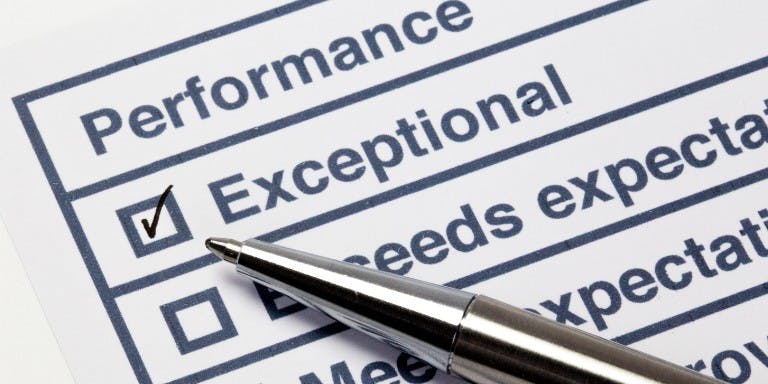First published on Thursday, June 4, 2020
Last updated on Thursday, February 27, 2025
Jump to section
Employee appraisals play a crucial role in the performance and professional development of your employees.
If a performance appraisal is done well, with the right preparation and management training, you can conduct performance reviews that support the success and growth of your team.
In this article we explore the importance of employee appraisals in the workplace, how they can be used to support your team, and how performance management software can support this process.
The role of appraisals within performance management
From identifying employee training needs, to spotting your company’s rising stars, employee appraisals have many important uses, including:
Improving the performance of employees
Measuring and rewarding performance
Supporting employee development
Spotting potential within the team
Managing changing roles
Giving employees a voice
As part of the important performance management process, employee appraisals provide a formal setting in which employees and managers can discuss performance. Both reviewing the job performance of an employee over a particular time frame and planning future objectives and goals.
This style of meeting, although not a legal requirement, is carried out in a range of businesses and industries. Used to gain an oversight of how an employee has performed in their role and what can be done to improve output in line with business objectives.
Using appraisals to measure and reward performance
The first and most obvious purpose of employee appraisals is to measure employees’ performance. Your organisation might need to do this for several reasons:
To make sure employees are working to the required standard
To gauge which employees are performing the best and therefore eligible for bonuses, pay rises and other rewards
To address performance issues where necessary such as underperforming employees
The performance of your staff will of course have a direct impact on the success and growth of your business. Therefore, the value of employee appraisals, not just for individuals, but for the business can be huge.
Using appraisals for employee development
Whether staff are performing well or poorly, employee appraisals present an ideal opportunity for HR to identify the next stage in their development. Many organisations use personal development plans (PDPs) within staff appraisals, to direct and record staff development. You can use PDPs to set development goals that the employee should try to reach before their next appraisal.
For underperforming staff, you can use appraisals to identify skills gaps and training needs. Employees can then take the training programmes they need to perform their role better.
Another option for underperformance is the use of a performance improvement plan (PIP). This is like a PDP In the sense that it identifies areas for improvement and provides the employee with actionable steps to take to improve their job performance.
Using appraisals to spot potential
Appraisals aren’t just for remedial action. They’re also a moment to sit down with your best-performing employees and to map out their career path. Rather than addressing skills gaps, this may include offering training to develop skills required for promotion.
Appraisals are therefore extremely useful in the talent management process, a major element of which is developing and retaining high-performing employees. Without an effective appraisal system, you might never spot talented individuals who could be the future of your organisation.
You could opt to recognise and praise high performance with the following types of rewards:
Internal promotions
Salary increases
Bonuses
Extra annual leave
Investment into training and development
Using appraisals to manage changing roles
Almost every job role changes over time, whether because of new technology, new products and services your company introduces, or changes to the size of your team. Employees often need help to understand these changes and how their role is affected. Appraisals are an ideal time to manage this, by:
Explaining new responsibilities clearly
Setting clear goals related to the new responsibilities
Arranging training in latest technology or products
Using appraisals to improve performance
The goals you set in employee appraisals don’t just have to be about staff development. You can also challenge employees to improve their performance and increase your team’s productivity as a result.
Performance goals must be fair and achievable, or they could have a negative impact. Use performance data to set goals where possible — for example, if an employee’s performance has slipped below a previously recorded level, you can use that data to remind them they can do better.
SMART goals are a universally applicable methodology for setting goals and objectives. Making sure goals can be clearly understood by the employee and applied within their job role.
Giving your employees a voice
Finally, don’t forget that employee appraisals aren’t a one-way street. When they have worries, questions, or ideas, the one-to-one setting of an appraisal meeting is a great chance for employees to speak up.
When line managers listen to employees and address their concerns, the result can be a happier workforce. It’s yet another reason appraisals can be important to your organisation.
The benefits of employee appraisals
Whether you hold your employee appraisals annually or more frequently, they are clearly an incredibly valuable performance management tool. Used to review past performance, as well as look towards the future. It’s the perfect opportunity to discuss privately how an individual is performing but also how they may be feeling towards their role and what they wish for the future.
The benefits of employee appraisals apply to both employees, managers, and can have a positive impact on overall business performance. The list of benefits include:
Improves productivity and engagement
Better communication between managers and employees
Enhances workplace culture
Provides clear documentation and actionable steps for employees to follow
Highlights opportunities for development and employee training
Helps to identify and praise top performers within the company
While they can be time-consuming, the benefits to individuals and your organisation, make it well worth the investment.
Factors to consider when planning your employee appraisals
When developing your plan of action, make sure to outline the regularity of your performance reviews and set expectations in your employee handbook so that your staff have a better understanding of what to expect.
You can use performance appraisal forms and templates, to create a structured approach to your appraisal meetings. Ensuring the same process is followed with each member of staff. Before implementing appraisal meetings into your performance management processes, think about:
How often to hold appraisal meetings
What your shared company objectives and values are
How you plan to monitor and track employee progress
Who will conduct employee appraisal meetings
The type of rewards you can offer
You should also consider updating your HR documentation. Such as your employee handbooks and disciplinary procedures to include mention of performance reviews and to align these processes.
Get help with performance appraisals with BrightHR
While it may seem like a daunting and time-consuming process, employee appraisals can be made easier with the use of performance management software.
Helping you to create structured agendas for your meetings, store documentation in an easy-to-access platform, and track the progress of employee goals over time in just one screen.
Book a free demo today and see for yourself how BrightHR’s performance management software can streamline your performance management. Making your employee appraisal process a breeze.
Have a question?
Ask away, we’ve got lightning fast answers for UK business owners and employers powered by qualified experts.










